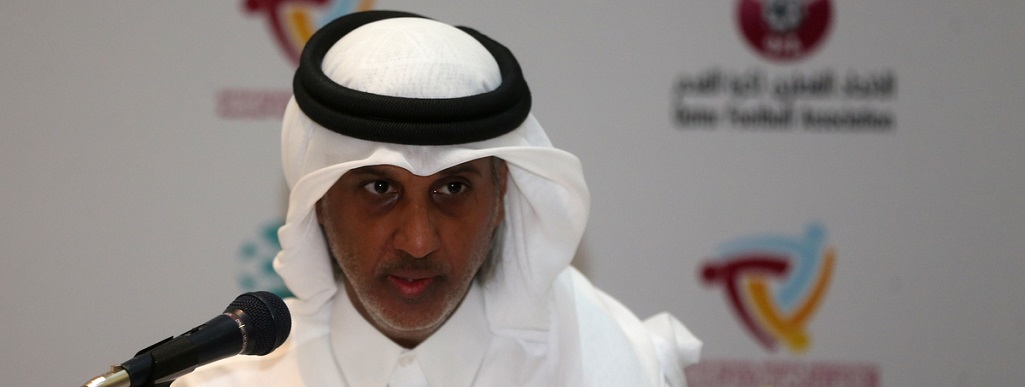
Tuesday, July 1st 2014 05:24 AM
DOHA: In an editorial published in today's edition of Australia's the Australian, Shaikh Hamad Bin Khalifa Bin Ahmed Al Thani, QFA President, board member of the Supreme Committee for Delivery & Legacy, added up grounds on which Qatar was granted the right to host the 2022 World Cup.
Addressing the Australian public - Australia was a candidate in the host selection race alongside, Japan, South Korea, United States and Qatar - he also tackled arguments for stripping Qatar off the right to host the prestigious event set to take place eight years from now.
He was quoted: I AM sure Australian soccer supporters are disappointed, although perhaps not surprised, that their side have not made it to the next stage of the World Cup after being drawn in one of the toughest groups. The Socceroos made, however, an impact and provided one of the moments of this, or any, tournament with Tim Cahill’s wonderful goal. While they surprised many fans around the world, Australian supporters knew there were good football reasons behind the performances.
Despite all you have read or heard, there are also good and legitimate reasons why Qatar won the right to host the tournament in 2022. I recognise why those not involved in the process might find Qatar’s success difficult to understand. Qatar does not have a rich football history. We are a small country. Temperatures are high in the summer. However unfairly, our wealth alone fuels suspicions. But our bid succeeded not because these big questions were ignored but because we provided compelling answers. We turned each challenge to our advantage. We won because our bid was seen as the best.
Qatar’s football history may be much younger than in Europe or South America but the passion for the game here and across the Middle East is every bit as intense. FIFA members understood this and were keen to take the tournament to a new region. The finals in the US in 1994, in Japan and South Korea in 2002 and South Africa in 2010 helped build football’s global popularity. This is the chance to take the tournament for the first time to millions of football fans in the Middle East. FIFA members were reassured, too, by our success in staging other major sporting events such as the 2006 Asian Games, the 2011 pan-Arab games and the 2011 Asian Cup.
The size of our country gave these events a very different feel. We spoke of a compact World Cup where teams and fans won’t have to fly huge distances between venues, unlike in Brazil or in Russia in four years’ time.
We faced, of course, strong competition to host the 2022 Cup. As you would expect from a country with such a love of all sports, Australia was also a very serious contender. We are just grateful that FIFA chose to take the finals to the Middle East, where soccer is the No 1 sport, first. Our geography also means that two billion people are within four hours’ flying time of our new airport at Doha, which cuts time and costs of travel for supporters.
The heat of our summer is seen by critics as the main reason why we could not possibly have won the finals fair and square. But we showed how matches could be played and watched in comfortable conditions. Playing the tournament in winter was not part of our bid. It might seem to some that airconditioned stadiums are flights of fancy but we have had cooling systems for outdoor events since 2008. We have invested in research and development to find how cooling could be powered by solar and renewable technologies, which we promised FIFA we would share with others.
I accept that we spent more money campaigning than other bids but this was solely to catch up with our better known rivals. So we had to tell people about our country and what we could offer, to overcome the perceived obstacles and communicate our ambitions to a global audience. From the day we launched our bid to the day we won the contest in Zurich, we played strictly by the rules. It is why we are happy to co-operate fully with FIFA’s inquiry. We have nothing to hide or fear.
The false allegations made against us have obscured two more reasons why FIFA chose Qatar. We set out how we wanted the World Cup to be a catalyst for positive change in our country and region. We have been as good as our word and have already taken steps, for example, to modernise our labour laws. We also stressed that staging the finals in the Middle East would improve understanding within and beyond the region. As we have seen in Brazil, the World Cup has a remarkable ability to bring people and cultures together.
There are sadly plenty of divisions and misunderstandings in our world, but the shared passion for football can shake prejudices and unite people around what they have in common. This message — which has never been more important — was at the heart of our bid. It is also why we look forward to welcoming the world in 2022 and we are confident that it will be an amazing event.
Sheik Hamad bin Khalifa bin Ahmed Al Thani is president of the Qatar Football Association.
